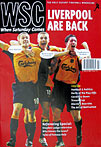 Despite a magnificent cup run, German minnows FC Union's success may not last long, writes Markus Hesselmann
Despite a magnificent cup run, German minnows FC Union's success may not last long, writes Markus Hesselmann
In the weeks between promotion and cup final, Union were all the rage in Germany. The club made headlines in the arts pages of the national newspapers. There were television features about the upright working-class blokes from the eastern district of Köpenick, who had always been subdued by the Stasi but would now arise as the true team of east Berlin and the whole of eastern Germany.
Not everybody believed the hype. Union player Jens Tschiedel had a point when he said after the cup final that it was disappointing for the team that there were 50,000 Schalke fans among a crowd of 70,000 in Berlin’s Olympic Stadium. “It was an away game for us,” Tschiedel said. The club’s main benefactor, Michael Kölmel, who made a fortune with his film company Kinowelt and kept the club alive as a sponsor after it had nearly gone broke in the Nineties, added: “Obviously we are not yet smart enough. Schalke showed us how to organise ticket sales and fill a large stadium.”
And when the city’s embattled mayor, Eberhard Diepgen, wanted to have his share of the success and present Berlin’s new heroes to Berliners, only a few hundred fans showed up in the large square in front of the town hall to cheer the team on the balcony. A much bigger crowd came later in the afternoon to the large cup final party in downtown Köpenick.
Union, it appears, are still very much a local team in spite of all the claims for a regional or even national appeal. But that may change. Not only because the club will play with bigshot fellow Berliners Hertha BSC in the UEFA Cup next season, since Schalke’s Champions League qualification left a place open for the cup final losers. Union have a potential that Kölmel describes as “unlimited”. Compared to London or other European capitals where many professional teams compete for the attention of sponsors, fans and media, Berlin is a football desert, with only Hertha and nothing much more. Tennis Borussia, the favourites of arty west Berliners, have just gone down to the fourth division. Dynamo, ten times GDR champions, may still win promotion to the third division but they still have a tricky image problem as the former Stasi club.
That leaves a lot for Union in a city of four million people where not everyone loves Hertha. When Kölmel joined Union he predicted the club would soon replace Bundesliga survivalists Hansa Rostock as the team the whole of east Germany sees as theirs. But things went wrong. Union, already nicknamed Die Unaufsteigbaren (the unpromotables), having been denied promotion for financial reasons as well as through on-field failure more than once, made a mess of another campaign last year when they lost in the play-offs to LR Ahlen, a small team from the Westphalian countryside.
Now Kölmel sounds a bit more modest: “We don’t want to push anyone away. But our claim for a regional following still stands.” Kölmel, who has pumped around £3 million into the club, stresses that Union were his first football acquisition, before he started on a shopping tour all over Germany and saved 13 other clubs from going bankrupt.
But danger looms: two days after the cup final, Kölmel’s Kinowelt had to admit that it cannot meet the expectations of its shareholders. The once booming company might even be in the red this year, a colour well known to Union fans and not just because of their shirts.
From WSC 173 July 2001. What was happening this month